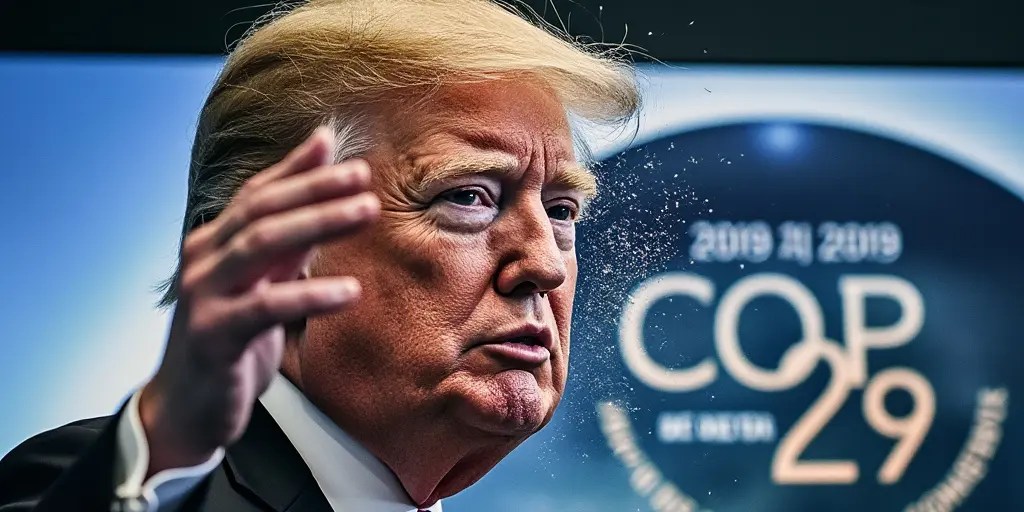The global climate circus, formally known as the 29th United Nations Climate Change Conference (COP29), is underway in Baku, Azerbaijan, and the timing couldn’t be better. Or worse—depending on your perspective.
Donald Trump’s return to the White House has delivered a well-deserved gut punch to the assembled climate faithful.
After all, nothing ruins a good sermon on planetary salvation like a parishioner who refuses to take the gospel seriously.
While COP29 delegates scurry to manufacture “consensus,” the reality is clear: global climate policy was always a house of cards, and Trump’s election is the gust of wind that exposes its flimsy foundation.
Trump’s Record: Climate Realism Over Ideology
Say what you will about Trump, but at least he’s consistent. His first term shredded the Paris Agreement and unapologetically promoted American energy independence, prioritizing economic pragmatism over nebulous climate goals. Now, with a second term, the climate crusaders are sweating—not because of global warming, but because their multi-trillion-dollar plans depend on the unquestioning cooperation of the United States.
The Paris Agreement itself, hailed as a landmark in climate diplomacy, is fundamentally toothless. Even the International Energy Agency (IEA) admits that current commitments fall far short of the targets it claims are necessary. With Trump back in charge, even these ineffective promises are likely to be ignored. Let’s be honest—shouldn’t we applaud the clarity? At least someone is willing to call the bluff.
COP29: A Summit in Disarray
If Trump’s victory isn’t enough to sour the mood in Baku, the absence of major world leaders has surely done the trick. The European Union’s Ursula von der Leyen, Brazil’s Lula da Silva, and other prominent figures are conveniently “too busy” to attend, leaving the climate choir without its star soloists.
Empty Chairs and Empty Promises
This lack of attendance is more than a scheduling conflict; it’s a silent acknowledgment that the climate summit routine is losing steam. Decades of annual COP meetings have delivered little beyond bloated communiqués and unenforceable agreements. The true believers, of course, will still emerge with proclamations of “progress,” but anyone paying attention knows the truth: the wheels are coming off.
The $1 Trillion Fantasy
One of the main agenda items at COP29 is a proposal to funnel $1 trillion annually to developing nations for climate adaptation and mitigation. How to fund this massive wealth transfer? Ideas range from taxing oil companies to levies on air travel and shipping.
It’s an impressive grift, but let’s break it down. Developing countries demand reparations for a problem they claim they didn’t cause, while rich nations pledge money they don’t have. Even if these taxes materialized (highly doubtful), the funds would likely be squandered on boondoggles like solar farms that stop working after two years or wind turbines that can’t survive a stiff breeze.
Developing Nations: Right to Complain or Convenient Excuse?
The loudest voices at COP29 come from countries that portray themselves as victims of industrialized nations. Yet many of these same countries are doubling down on coal, oil, and gas projects, proving once again that hypocrisy is the true renewable resource. With Trump unwilling to play the guilt-ridden benefactor, these nations may need to rethink their strategy—or better yet, focus on real development instead of chasing climate handouts.
Azerbaijan: Petrostate Hosts the Climate Cult
Choosing Azerbaijan to host COP29 is either peak irony or a moment of clarity. A nation whose economy relies on oil and gas exports is now the stage for global discussions on phasing out fossil fuels. It’s like asking a fox to guard the henhouse—and then handing it a cookbook.
The official line is that Azerbaijan is diversifying into renewables, but let’s not kid ourselves. Hosting COP29 is a PR stunt, an opportunity to burnish the country’s image while continuing to rake in profits from the very resources the climate crowd wants to eliminate.
What Does This Say About Climate Policy?
The choice of Azerbaijan is emblematic of a larger truth: climate diplomacy is rife with contradictions. World leaders preach austerity while flying in private jets. Fossil-fuel-dependent nations promise net zero. And now, the champions of decarbonization are meeting in a petrostate. It’s all theater, and the audience is growing weary.
The Decline of Climate Diplomacy
Let’s face it: the COP process was never designed to succeed. It relies on unenforceable agreements and the goodwill of nations with conflicting interests. The result is a predictable cycle of overhyped announcements, vague pledges, and little action.
The Problem with Consensus
By requiring unanimity, COP summits effectively guarantee mediocrity. Every nation gets a veto, and any serious proposal is watered down to meaninglessness. Add to this the political instability in key countries—Trump in the U.S., geopolitical tensions in Europe, and economic turmoil in developing nations—and the cracks in the system become glaringly obvious.
What’s the Point?
The most amusing part of COP29 is the pretense that any of this matters. Even if the proposed $1 trillion fund were fully realized (spoiler alert: it won’t be), it wouldn’t make a dent in global emissions. Why? Because China and India, the world’s largest emitters, are still building coal plants faster than you can say “carbon offset.”
Conclusion: Schadenfreude and Reality
Trump’s re-election is a sharp reminder of the futility of global climate policies. His unapologetic rejection of climate orthodoxy exposes what many already suspect: these summits are little more than elaborate charades, divorced from practical realities and rife with contradictions.
Instead of bemoaning Trump’s return, perhaps the climate faithful should thank him. By refusing to play along, he’s exposing the hollowness of their agenda. And if COP29 achieves nothing beyond demonstrating that truth, then it will have been a summit worth remembering.
Related


